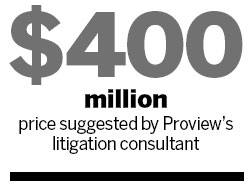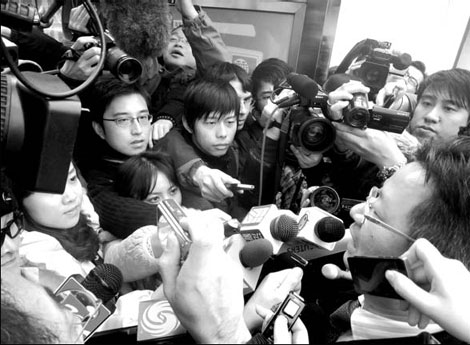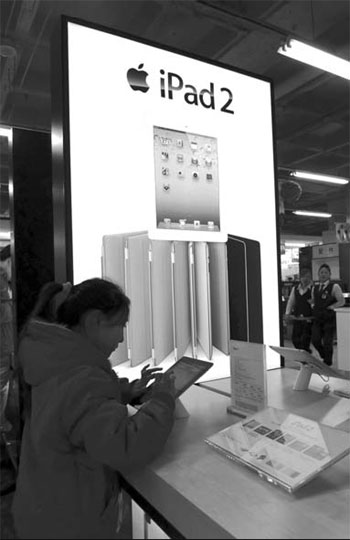Court set to hear appeal of iPad trademark ruling
Updated: 2012-02-29 08:01
By Zhang Zhao (China Daily)
|
|||||||||||
|
A Proview Technology attorney surrounded by reporters as a Pudong district court in Shanghai considered a bid to stop iPad sales. With the case under appeal at a higher court in Guangdong province, the court declined to enforce a ban. Gao'erqiang / China Daily |
Complex case, insatiable appetite for Apple devices
When the Guangdong High People's Court begins hearing an appeal today in the much-publicized iPad trademark dispute, it will be the latest chapter in a convoluted saga of subsidiary firms, the enormous debt of a failed electronics company and the value of one of the world's most-recognized product names.
As the second trial in the case and an appeal of a lower court decision, the verdict will be final under Chinese law.
If the court finds that international electronics giant Apple Inc infringed on the trademark rights of Proview Technology, its wildly popular iPad tablet computers will be banned from sale on the Chinese mainland.
"Very little new evidence can be presented to the higher court on appeal, so the lawyers' strategies will play a more important part," National Business Daily quoted an anonymous lawyer saying.
Coming into the latest legal battle, Apple has hired a new law firm, King & Wood, believed to be one of the nation's best in intellectual property. Jiang Zhipei, the former presiding judge of the IP division at the Supreme People's Court, is a consultant to the firm.
For its part, Proview Technology has kept the same legal team it had when it prevailed in a Shenzhen court last November.
Li Su, litigation consultant for Proview, which is based in Shenzhen, gave the odds of his client winning "as high as 80 to 90 percent" at a press conference on Feb 17.
There could be cause for optimism. Proview's victory in Shenzhen "was made after two years of investigation", said independent lawyer Qu Yinghua from the Shanghai Guonian Law Firm.
"Over those two years, the court must have communicated with the higher court, so the original judgment is very likely to be upheld," he said.
But in a related case heard last week in Shanghai - where Proview Technology sued Apple's chief distributor in China - the court rejected a request to stop iPad sales.
Adding to the complexity, Proview announced on Feb 24 that it had filed suit against Apple in the United States.
Debt-ridden

Cash-strapped Proview has set a price of $400 million for the trademark, funds its Hong Kong-listed parent company Proview International needs to service nearly $500 million in debt. The company's creditors include Bank of China and Bank of Communications.
Trade in Proview shares was suspended on the Hong Kong exchange in May after it declared bankruptcy.
With its assets frozen, the iPad trademark is believed to hold the greatest potential value for Proview.
You Yunting, a partner at the DeBund Law office, said Apple "definitely would not accept the price" because it would be very bad for its global strategy.
When Apple unveiled the iPhone, it bought the trademark from Chinese electronics company Hanvon for only $3.65 million.
The US company communicated about a settlement with Proview after losing the first court case, but "it never talked about the essence or gave a feasibility plan", said Xiao Caiyuan, another lawyer for Proview Technology.
"We believe Apple doesn't want to negotiate," he said.
One seal missing
The final round in court will also hear legalities about Apple's original effort to acquire the name.
Using a UK shell company, Apple bought the iPad trademark from Taiwan Proview Electronics in 2009.
According to Wang Tianle, general manager of the Henan trademark law firm Windbrand, Apple "might have thought the deal included the Chinese mainland" as the corporate representative of both Shenzhen and Taiwan Proview was the same person - Rowell Yang, also known as Yang Long-san.
But Apple failed to notice the difference in regulations between Taiwan and the mainland, Wang said.
"In Taiwan, the signature of the company's chairman on the contract will be OK, but according to laws on the Chinese mainland, the company's seal counts," he explained.
The contract for the iPad trademark transfer does not include the seal of Proview Technology.
"If Apple and Yang both understood that the contract included Shenzhen Proview and affixed a seal (of the Shenzhen company), then there would not be a dispute now," he said.
More than a trademark
Industry insiders say the impact of the case goes beyond a trademark.
"It is hard to say which side is cheating the other," Wang said. "It has now come to a stage that is not just as simple as a trademark dispute, but rather like fighting for bigger benefits.
"One trademark can revive a company, and can ruin it, too," he said. "Foreign companies have been using intellectual property as a weapon on Chinese counterparts and the iPad event may become a great victory for a Chinese company in the IP battlefield.
"But in the end, they must calm down and compete in a rational way," he added.
"Compared with developed countries, China has limited competence in protecting intellectual property rights," said attorney Qu. "Today, competition among big companies is about intellectual property."
"Apple products have very simple names that are easy to register as trademarks by others," said You. "If Apple insists it will not change the names, it has to face the problem of purchasing trademarks on a global scale."
Facebook, another global IT giant, has filed dozens of trademark applications in China since 2006, although it has yet to enter the market.
China Daily
|
A visitor experiences an iPad at an electronics shop in Tianjin. Part of Proview's strategy has been to request a ban on sales. Li Shengli / China Daily |
(China Daily 02/29/2012 page17)
Today's Top News
President Xi confident in recovery from quake
H7N9 update: 104 cases, 21 deaths
Telecom workers restore links
Coal mine blast kills 18 in Jilin
Intl scholarship puts China on the map
More bird flu patients discharged
Gold loses sheen, but still a safe bet
US 'turns blind eye to human rights'
Hot Topics
Lunar probe , China growth forecasts, Emission rules get tougher, China seen through 'colored lens', International board,
Editor's Picks

|

|

|

|

|

|







